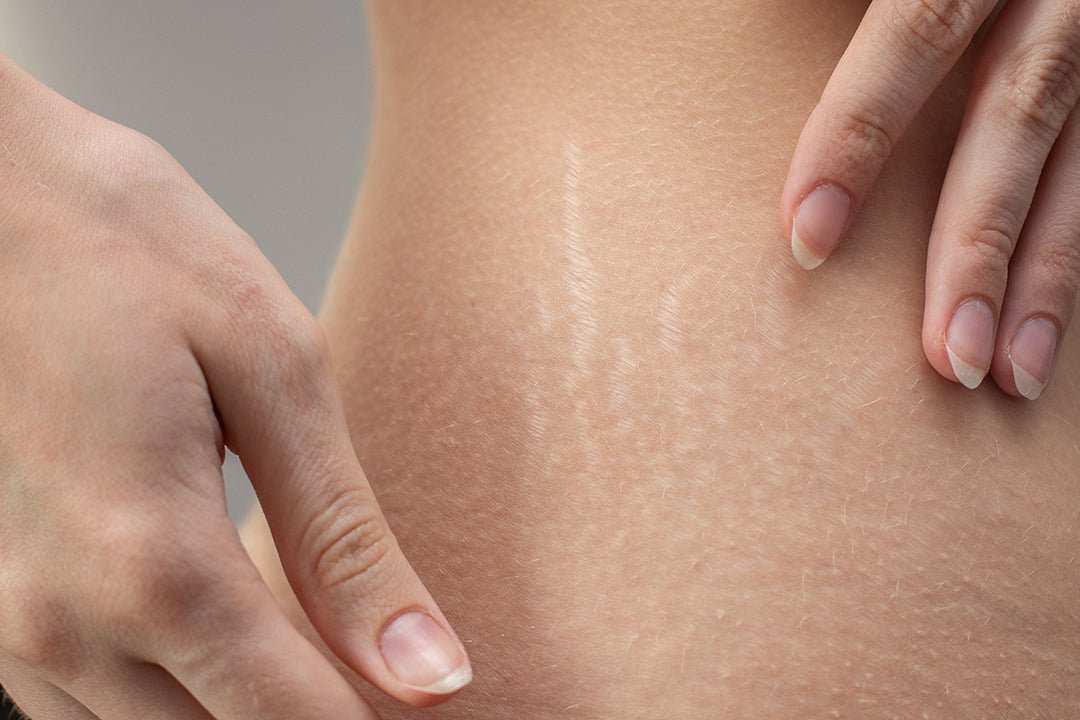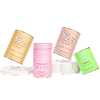Does Collagen Reduce Stretch Marks?
Posted 26th January 2022

Stretch marks are incredibly common. Just look at the statistics: research shows that approximately 90% of pregnant women, 70% of adolescent females, and 40% of adolescent males deal with these striated scars. Still, there's no denying the emotional distress stretch marks could cause. Unfortunately, though, despite the tons of misleading information out there on the net, there is currently no at-home product (including supplements) or in-office treatment that’ll make your stretch marks disappear. That’s a fact.
Not something you expected to hear? Well, we just thought it necessary to temper your expectations before diving into this article. Because while you can't “destroy” your existing stretch marks, you could minimize their appearance. And one way you could do so is through collagen supplementation. So, let’s talk about that.
How Does Collagen Reduce Stretch Marks?
To understand how collagen reduces stretch marks, it'll help if you knew what the latter is – and how they form in the first place. Stretch marks are tears in the collagen fabric of the dermis layer (i.e., your skin's "middle layer") that occur whenever the skin is stretched beyond its tensile limits.
This typically occurs when there's a period of rapid growth in the body. Examples include pregnancy, weight gain, growth spurts, or increased muscle mass. And when the skin returns to its normal state (e.g., after giving birth), it ends up looking lined and "wrinkled" because it's not supported by the usual collagen structure underneath.
This, in turn, explains why collagen could help reduce the appearance of your stretch marks. Like how oral collagen supplements could boost collagen production in your skin to promote a youthful-looking complexion, they could also do the same for regions plagued with stretch marks. In turn, "smoothing out" your stretch marks.
Just one thing to note: the rate at which your stretch marks fade hinges upon your stretch marks’ “age”. Stretch marks often begin as red marks (striae rubra) because blood vessels are present under the skin. These functioning blood vessels could help transport the collagen peptides to the scar sites – stimulating further collagen synthesis, encouraging the skin’s return to a healthy-looking state.
On the other hand, older stretch marks appear white (stria alba) because the underlying blood vessels have narrowed. This limits the transportation of collagen peptides (along with other nutrients essential to the healing process) to the scar sites.
How Much Collagen Should I Take to Reduce My Stretch Marks?
Interesting in using collagen supplements to reduce your stretch marks – but unsure of just how much you should take daily? We could look too research for the answer. In general, many of the studies available suggest that you’d be able to see improvements in skin elasticity, hydration, and density (all signs of increased collagen synthesis) with anywhere between 2.5 to 10 grams per day.
That said, we wouldn’t recommend you stick with such low dosages, especially if you’d like to see results fast. Reviews from our customers – who consistently take 15 grams of high-quality, hydrolyzed collagen peptides daily – have seen improvements in skin texture in as little as 2 weeks (compared to the typical 8 weeks or longer in studies)!
Can You Use Collagen to Prevent Stretch Marks?
Now, here comes the most crucial question: if you can't get rid of stretch marks, can you at least prevent them from occurring in the first place? You can. And the key to that – yep, you guessed it – is collagen. Why? Well, as mentioned earlier, stretch marks develop when your skin's connective tissue (i.e., collagen and elastin) snap during periods of rapid growth.
A potential reason this happens? It may be because your body doesn't have enough connective tissue to resist the "pulling" forces. Think about it this way: would it be easier to break one elastic band or ten elastic bands? That's right. It's the former. Reinforcing your body's "collagen stores" through collagen supplementation will thus help your skin better withstand stretching, preventing stretch marks from occurring. Note: supplementing your body’s collagen supply gets increasingly important with age because your body starts producing less of it the moment you hit your 20s (FYI: 1% decline yearly). So, you better start adding those elastic bands to your system – right now.
Picking Out the Right Collagen
Need help picking out a suitable collagen supplement that'll help fade and/or keep stretch marks away? Here are three things to look out for:
- Hyaluronic acid: By increasing moisture levels in the skin, hyaluronic acid can help keep stretch marks to a minimum (well-hydrated skin is less likely to break when stretched).
- Vitamin C: Stimulates collagen biosynthesis; the pairing of vitamin C and collagen in a supplement thus synergistically promotes collagen production, potentially speeding up the time it takes for you to see results.
- Hydrolyzed collagen peptides: The cleaving of large collagen molecules into smaller peptides makes it easier for your body to absorb – and make use of them, enhancing the supplement’s effectiveness. Oh, and don’t forget that you need at least 10-15 grams of collagen daily!
Finding it difficult to find a collagen supplement that’s formulated with all three winning ingredients? You can stop looking because we have it right here on The Collagen Co. Your stretch marks won’t even know what hit them.










































